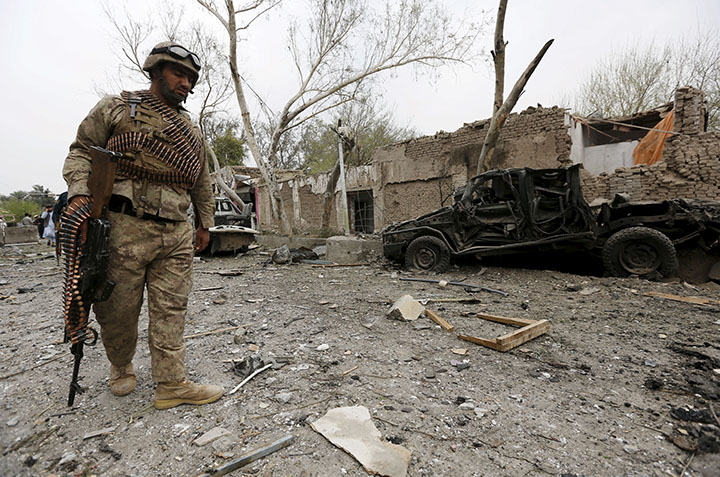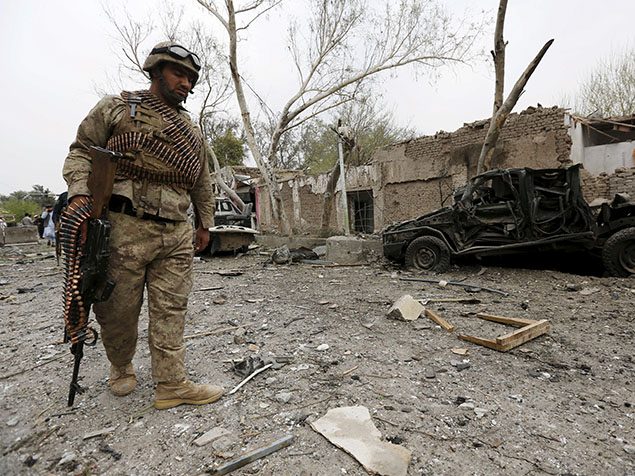 Amid concerning reports of security and political struggles that threaten to unravel the progress made thus far in Afghanistan, the question arises: what is to be done?
Amid concerning reports of security and political struggles that threaten to unravel the progress made thus far in Afghanistan, the question arises: what is to be done?
The answer, at once simple and difficult, is to help the Afghans prevail. We, Americans, our international partners in Afghanistan, and the Afghans themselves have too much at stake. We deserve a strategy that is geared toward success and commensurate with what is at risk. Fatigue is more than understandable, but is not the basis for good policy that protects our interests.
US and international engagement in Afghanistan should be seen in the context of the distorted and violent Islamic ideology—now manifest from Asia to Africa—that threatens our citizens, our values, and our way of life. Substantial bipartisan agreement exists among an array of senior figures and policy experts on the case for sustained US commitment to Afghanistan. It is to be hoped that such bipartisan support will extend to the presidential campaigns as well, and that our next President will not have an Afghanistan crisis on his or her desk upon entering the Oval Office.
The years 2014 and 2015 were marked by enormous political, security, and economic transition and uncertainty for Afghanistan. Doubt about an enduring US military presence encouraged Afghanistan’s enemies, discouraged and confused our friends, and led to hedging by regional actors. US commitment is a vital currency in the world. Clarity about our intent induces confidence in our partners and hesitation among our adversaries.
Now, with US President Barack Obama’s October 2015 decision not to complete the withdrawal of US forces as planned, there is clarity that there will be a significant US military role in Afghanistan without time limit. This is a vital indicator of US commitment to Afghanistan’s security and success. The political task now is to leverage that clarity to provide Afghans confidence that they can succeed, and to demonstrate to the Taliban that they cannot. This will in turn promote peace and stability in the region. It must be clear that there will not be space in Afghanistan for al Qaeda and Daesh [also known as the Islamic State of Iraq and al-Sham (ISIS)] to flourish, nor place for the Taliban absent a political settlement.
What can we do to increase the chances of prevailing?
First, we must increase the salience of the US and coalition military and intelligence commitment to Afghanistan. There should be no reduction from current troop levels until conditions and Afghan capabilities permit. Financial support from the United States and its partners is crucial. Critical gaps in close air support, intelligence, and logistics must continue to close, not widen.
Second, we must expand our commanders’ authorities to enable more flexible use of our military, especially air power, in support of the both the Afghan security forces and the counterterrorism mission. The recent decision to target Daesh in Afghanistan is a proper recognition of the threat.
Third, the Obama administration should declare that it is US policy, as long as we have a willing and committed Afghan partner, to prevent the fall of the constitutional government to the Taliban. It must be clear, as Obama has stated, that “the only real way to achieve the full drawdown of US and foreign troops from Afghanistan is through a lasting political settlement.”
Fourth, we must push a genuine regional effort to promote peace. A status quo encourages conflict. The Afghanistan-Pakistan-US-China forum offers promise. The test will be whether Pakistan takes concrete action to reduce the ability of the Taliban and the Haqqani Network to plan and launch attacks from its soil. If Pakistan fails to act, the prospects for a real peace are much reduced, if not illusory.
Fifth, the national unity government in Kabul needs to produce a steady pace of achievements. There is progress, albeit slow, and the challenges Afghanistan faces would be daunting even for a country that is used to coalition politics. Nevertheless, Afghanistan’s political class should understand that the support on offer must not be squandered.
Sixth, the United States and its partners should recognize that the threat to our security that emanates from Afghanistan is one element of the long term threat that much of the world faces from violence rooted in Islamic extremism. In Afghanistan, we have a willing Islamic partner that wants to contribute to security. Afghanistan must remain a key part of the network of counterterrorism partnerships that the world requires.
Let us not lose sight of Afghanistan as we did before. Succumbing to fatigue will lead to failure. Our efforts in Afghanistan are part and parcel of the challenge for the United States to help develop and implement a strategy to defend our people and values, while draining the life from the perverted version of Islam that animates Daesh, al Qaeda, the Taliban, and others of their ilk. The defeat of radical Islam can ultimately only come from within the Islamic world itself, but US commitment and leadership will be critical. We don’t have great choices, but we should recognize where the wrong ones will lead. Afghanistan’s success is part of a larger struggle that the civilized world, including more than 1.5 peace billion peace-loving Muslims, must win.
James B. Cunningham is the Khalilzad Chair on Afghanistan and Senior Fellow at the Atlantic Council. He is a former US Ambassador to Afghanistan, Israel, and the United Nations.
Image: An Afghan policeman inspects the site of a blast near the Indian Consulate in Jalalabad, Afghanistan, on March 2. (Reuters/Parwiz)
